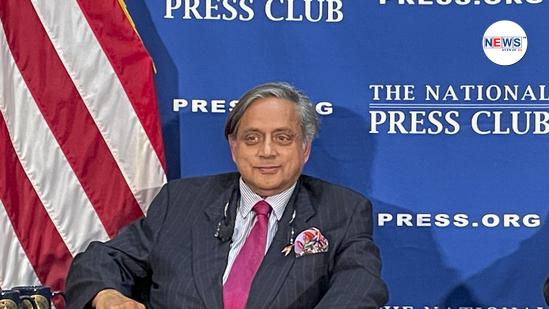
Congress MP Shashi Tharoor, who is in the United States leading an all-party delegation, was asked a question by his son, Ishan, on Thursday about Pakistan’s involvement in the Pahalgam terror attack.
Ishan Tharoor asked whether any country had asked the delegation led by his father for evidence of Pakistan’s involvement in the deadly Pahalgam terrorist attack on April 22 that killed 26 people, mostly tourists. He also asked about Pakistan’s consistent denial of its involvement in the attack. To this, Tharoor said India would not have retaliated in the way it did if there was not convincing evidence against Pakistan.
Responding to his son’s question, Tharoor said, “I’m very glad you raised this. I didn’t plant it, I promise you,” before adding that no country had asked for any such evidence.
“Very simply, no one had any doubt, and we were not asked for evidence. But the media have asked in two or three places. Let me say very clearly that India would not have done this without convincing evidence,” Tharoor said.
Shashi Tharoor’s ‘three reasons’
Further elaborating on Pakistan’s involvement in terrorism, Tharoor highlighted the country’s 37-year pattern of terror attacks accompanied by repeated denials. He brought up the Mumbai attacks in 2008 and Osama Bin Laden’s location near an army base in Pakistan.
1st reason – Mumbai attacks, Osama Bin Laden’s safe house
“But there were three particular reasons I want to draw your attention to all of you. The first is that we’ve had a 37-year pattern of repeated terror attacks from Pakistan, accompanied by repeated denials. I mean, Americans haven’t forgotten that Pakistan didn’t know, allegedly, where Osama bin Laden was until he was found in a Pakistani safe house right next to an army camp in a cantonment city. That’s Pakistan,” Tharoor said.
“Mumbai attacks- They denied having anything to do with it. One of the terrorists was captured alive. His name, his identity, and his address are in Pakistan. Everything was revealed under interrogation. He told us where he was trained and what was done,” he added.
Tharoor also talked about the recording of the Pakistani handler giving minute-by-minute instructions to the killers in Mumbai, which he said was recorded by both Indian and US intelligence.
“We know what Pakistan’s all about. They will dispatch terrorists. They will deny they did so until they’re actually caught with red hands. That’s the first,” he added.
2nd reason – Resistance Front claimed responsibility for Pahalgam attack
Shashi Tharoor highlighted that the Resistance Front (TRF), which he called a “well-known proxy front of the Lashkar-e-Taiba”, claimed responsibility for the April 22 Pahalgam terror attack “within 45 minutes or so” of the tragedy.
Tharoor said that the Resistance Front is “a banned organisation listed by the United Nations and the US State Department, which enjoys safe haven in the town of Muridke in Pakistan” and added that India had already presented evidence about the Resistance Front and its doings to the UN Committee on Terrorism in December 2023 and again in 2024. However, since Pakistan was also a member of the committee, the UN did not list the Resistance Front, but its identity was “known and publicised”, Tharoor added.
India was pursuing the listing of TRF in the United Nations by the UN Security Council’s UNCC 1267 sanctions committee.
“The world hadn’t even learned about this (attack) when they claimed credit, so that was itself a smoking gun. They repeated that claim 24 hours later, and having repeated that claim 24 hours later, then their handlers must have woken up to the gravity of this and told them to take it off their side, so they did, but the fact is the credit claim was on record and the world has seen it,” Tharoor said.
3rd reason – Funerals conducted for terrorists in Pakistan
For his third point, Tharoor highlighted how funerals were conducted for the members of terrorist organisations such as Jaish-e-Mohammad and Lashkar-e-Taiba after India’s first strike on May 7.
India launched Operation Sindoor in response to the Pahalgam terror attack on May 7 and hit nine terror bases across Pakistan and Pakistan occupied Kashmir (PoK) through precision strikes.
“When the first strikes happened on the terrorist camps, funerals were conducted, including for members of key organisations, the Jaish-e-Mohammad and the Lashkar-e-Taiba. The funerals were conducted, and photographs have emerged on social media showing Pakistani generals and police officers in uniform attending these funerals being conducted by relatives of these terrorists. So we’re looking at three concrete pieces of evidence as far as India is concerned”.





